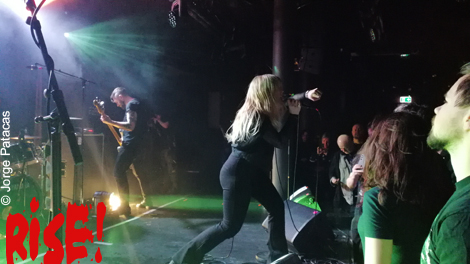by Jorge Patacas
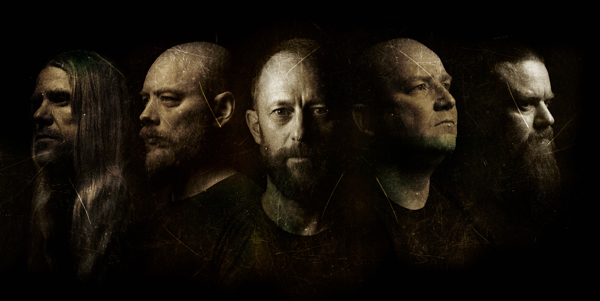
The Norwegian avant-garde/progressive metal band Vulture Industries is going to release their fifth studio album “Ghosts from the Past” in June, so it was the perfect opportunity to sit and have a conversation with vocalist Bjørnar Nilsen about the concept behind the new material, details about the album cover, music videos and other topics, including the top 3 typical Norwegian things he does!
RISE!: – You have a new album coming out in June called “Ghosts from the Past”. The press release says that “Ghosts from the Past” draws a line from childhood spells of dark mystery and a sympathy for the outcast, to a present where monsters hide under your bed. Is this a personal album then? Based on a true story?
Bjørnar Nilsen: It’s a personal album in the sense that it reflects my view of the world and how I see things, how I understand the world evolving around us. I see the world evolving into a darker and more scary place. You have countries that you would have never expected starting to draw towards old ideas and just dressing it up as something new, going towards more totalitarian and oppressive rules and regimes and I find this very unnerving. The album’s thematics and feel of it is a mix of these things combined with fascination with the obscure and art of a darker kind, old movies, books…
R!: – The writing and production period for this album took around four years, right?
BN: Well, it’s actually six years since we released the last album, but to be honest it’s not that we’ve been working on this new album for six years. Two of us got two children each in this period, which have delayed things and with me doing most of the writing and having two kids, being a father and being around for the kids is important. My priorities have been a bit different for this period than before where I could just dive into it and do music for long periods of time and more or less just thinking about myself. Making music is a pretty introvert experience for me where I go very much into it and block myself out from the outside world, so combining it with small children is not always the easiest thing. But now they’re 6 and 3 years old, so it’s getting easier. I’m getting the evenings back where I can sit and have some hours to be writing and working with music and also I’m in a position where I’m pretty flexible with my work situation, so I come from time to time and take whole days where I work writing music instead of doing office work, so that’s nice.
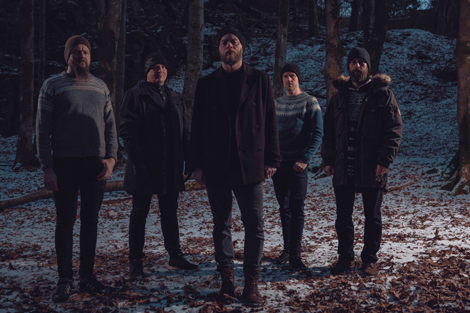
R!: – You mentioned some of the reasons why it took so long to come up with a new album, but how did the circumstances in 2020 and 2021 influence the ideas you already had before that period when it comes to the lyrical content or the music itself?
BN: The world around me strongly influences how the lyrics turn out and how the vibe of an album turns out. It’s kind of mirroring my moods and I would say it’s kind of a window into my soul in a sense, and trying to express something without talking about it directly.
R!: – Is it true that you had a mandate to serve soup in one of your concerts during that period?
BN: Yes, we did a concert at Hulen in Bergen where it was mandatory to serve soup during the concert because you could only come if you ate. It was mandatory to eat. The only way to keep a venue open during that time was to serve food. It got completely fucked up, it got ridiculous. People were just handing out food to avoid the restrictions. It was just handing out garbage, producing stuff that people didn’t really want, so half of it was just thrown out. You had the same thing going on in pubs, they were serving toasts or hot dogs and stuff like that. I can understand that you need to find ways to make things work both from the government and from the venue perspective, but it was like “man, get a grip, look at what you’re doing, this is just fucked up”. Also, when it came to the limits of the number of people you could have in venues, they were not going into the venues and actually looking at that and this was going on for one year. So Grieghallen where you can normally have thousands of people, they had the same restrictions as the cellar of a pub. It’s completely senseless.
R!: – The new album was produced and mixed by yourself at Conclave & Earshot Studios. This is your own studio, right?
BN: Yes, I run it together with Herbrand (Larsen) and Arve (Isdal) from Enslaved, even though Herbrand is no longer in the band. We have the studio in Bergen. We were having separate studios many years ago and I was looking for a new place to relocate my studio. It basically started up like a bedroom studio. The first name was actually Filthy Bedroom Studios, but as I was starting to get some clients, I figured it was a good idea to change the name, so it became Conclave Studios. Then when I was looking for a new place, somebody told me that Herbrand and Arve had lost their previous studio space and were also looking for something, so we figured it made sense to do something together. We’ve had the studio for fourteen years I guess and we’ve done a lot of the metal and hard rock coming out of Bergen during that period, but now I have scaled down a bit on the studio work because I don’t have so much time to do it anymore, so I do two or three albums per year.
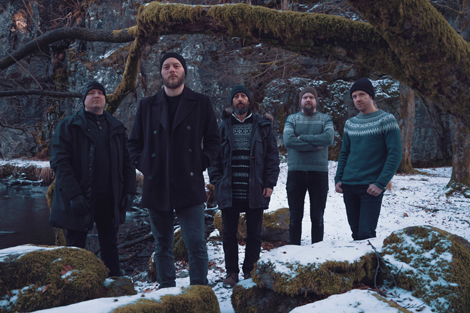
R!: – Having your own studio gives you more freedom when it comes to time, you have your own schedule in a way, but what about the record label for instance? Do they give you total freedom when it comes to that?
BN: Once the release cycle starts, then you start having deadlines, but up until you deliver the master you’re pretty much free to do as you wish. But of course, if you spend ages to do it, people will kind of forget about you and you might need to renegotiate the deal because you may not be worth what you were worth ten years ago. As long as you keep within a slightly sensible timeframe, then I think it’s fine. Most of the independent metal labels seem to be pretty lax when it comes to this. The bands are allowed to take their time and work in a tempo that feels comfortable for them.
R!: – The first single is “New Lords of Light”, why did you choose this one in particular?
BN: Because it’s very upbeat and catchy, so it’s a good introduction to the album I think and it kind of wraps the listener quite quickly. It’s also one of the best songs of the album I think.
R!: – You’ve also shot a video for this song. Do you enjoy shooting videos in general?
BN: Yes, it’s a bit stressful because you’re really on a schedule, you have to make things within a short timeframe. You have the filming schedule where you have the camera team and the venue available and everything needs to work out. There were not too many people involved in the production of this video, so we didn’t have a sound tech for the venue. The light tech was also the sound tech and the venue had taken away the mixing desk, so there was just a minimal mixing desk as a temporary solution. We had real problems with getting the monitoring to work, to synchronize the playing and the music because we could only get sound for the main PA, so what we got up on stage was basically the reflection from the back wall of the main PA and having our drummer playing tight to that was not very easy, but luckily we managed to fix the situation in the end and it turned out really nice. It was a nice process working on this video. I got the idea of using old film footage that had become public domain and I really like old movies, so I got the idea from this one called “Carnival of Souls” that it would be nice to mix with our stuff because it had imagery that really fit with our style and atmosphere. I have a pretty primitive video editing program on my laptop, so I was spending saturday night just taking cuts from this movie and placing them on the music while I was enjoying a couple of glasses of red wine, and that became the basic outline for the video. Then of course we needed to have some professional people to make a proper production. So we got Jarle (Hovda Moe) who have been doing lots of photo sessions with us in the past and he also did our streaming shows, so we got him to film and edit the video. He did a really good job. The feedback has been really good on the video, so it turned out nice.
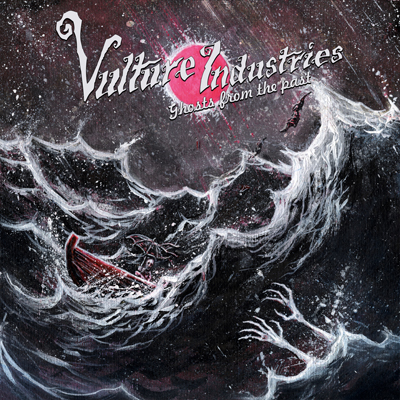
R!: – Let’s talk about the album cover which was done by a well-known artist from Bergen, Kim Diaz Holm. Why did you choose him to work on this cover and did you give him the idea or he came up with his own?
BN: We decided that we needed something a bit rough for the album cover and I really like his style. He’s also a really nice guy, a good friend of ours, so it felt natural to ask him and he really liked the album, so that was a good start. Initially we had this idea to have a photo on the album cover instead of graphics and we wanted to make this photo session with a silhouette of a person sitting in a boat just holding an umbrella and be carried around by the waves. Being shielded by one element meanwhile you have no control of where you’re actually going which it’s a bit of how I’m feeling in the world these days. So when we approached him, this idea was already there and we also had a couple of other ideas that we were thinking about, but this was definitely the best idea. Kim agreed and two weeks later he sent us the final picture and just needed a couple of adjustments, then it was perfect.
R!: – You have a very unique vocal style so I’m wondering what your influences were when growing up.
BN: When growing up I guess I had lots of the same influences that many other kids growing up in the late 80’s had. I think my first cassette was Samantha Fox (laughs)
R!: – That’s probably not an influence (laughs)
BN: That has very little to do with what I do these days. I remember my mother had a car that she sometimes lend to a friend and her friend had a boy that was a bit older than me and he was into Def Leppard. Once he used the car and he forgot a Def Leppard cassette in the cassette player, and that was my first real experience with hard rock. I really liked the energy, the feeling of exaltment when you were listening to it and from there I got into a bit harder music. My first metal and hard rock albums were Alice Cooper’s “Hey Stoopid” and “Trash”, then I bought the black album by Metallica just when it came out and I bought my first Sony discman together with the album. I remember sitting in the back of my mother’s car, putting the earpads and said “give me noise” and pressed play. I felt really cool. Then I moved on to their earlier albums which I listen more to these days if I listen to Metallica, even though it’s a bit in the past for me.
R!: – The band has always been very theatrical, how would you describe the concept behind your image?
BN: I think it’s not so much about a conscious concept or trying to actually make something. It’s more about going with something primal and it turns into this. It’s letting loose all restraints and just becoming something else, a bit like Dr. Jekyll & Mr. Hyde just without the alchemy. I would say what you see on stage is not me trying or pretending to do something, it’s more letting go of the facade and revealing something that’s there, but still not something that really works for you to live in normal lives, so you have to restrain it and keep it away, but on stage you can do it.
R!: – Who came up with that name Vulture Industries?
BN: It was me I think (laughs). At the time our sound was a bit different to what it is today. It was a bit more industrial, so this name felt fitting at the time. Once you put down the chess piece it remains on the board, you just have to stick with it.
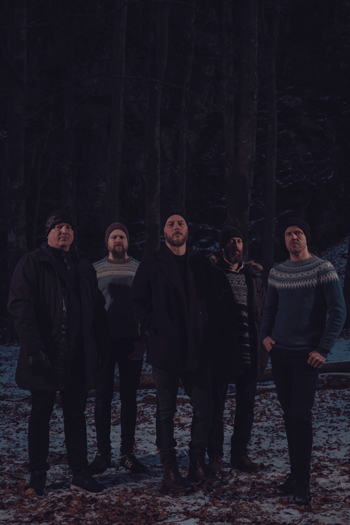
R!: – Yes, because you actually started with a different name and then you changed it to Vulture Industries, but you have a career now.
BN: Yes, at that time we were just a local band that played some local shows, so a name change made no difference, but now it’s a bit late for that. I kind of thought about it like “does it fit us anymore? Is it something we should change?”, but at some point the original meaning behind the words kind of disappears from a band name and what you think about when you hear it is the actual band. You can basically be named Bread and after a while it works (laughs)
R!: – Korn can be an example (laughs)
BN: Korn, for sure.
R!: – You told me you bought the black album when it came out. This was 1991, so you probably remember all the black metal events that happened in the early 90’s. What were your thoughts at the time?
BN: It was scary stuff. I was young at the time, all the guys who were in the scene back then were older than me and it made a really strong impression to see these news reports about church burnings, murder, the court case against Greven, but it was also fascinating. A couple of years later, I started to get into black metal as well. Of that scene I would say that Emperor was probably the band that caught me the most and also I really liked Dødheimsgard and Enslaved, they’ve done some really good albums, but I liked them more a bit later. For some time I was quite into Covenant and Dimmu Borgir.
R!: – You’ve had pretty much the same lineup for around 20 years now which is not easy for bands these days…
BN: Yeah, We had a keyboard player when we started out, so he’s only on the first demo I think, but he was not so much into travelling and so on, so he pulled out very early. I think he was in the band for one or two years and since then we’ve had the same lineup.
R!: – What do you think are the keys for that? Is it the same mindset, friendship or not engaging in long tours very often?
BN: I think it’s about balance. You have to see the other people and have to balance ambition with the limitations that you know are present in the lives of the different members and respect that. I’m probably the most ambitious one in the band, I want things to happen, I want us to tour, play festivals and do a decent piece of work when we release an album and follow up on the release instead of just putting it out there. So I’m pushing towards work, but at the same time I know it’s not possible for everyone to do the same amount of work as I can, so you can’t go into thinking that everybody has to do the same and that everybody has to put the same amount of effort into it. You kind of just have to sit back and say “ok, now I did a lot of work and some of the guys contributed to this, everybody contributed to the album, everybody’s taking time off from their jobs and families to go to rehearsals and do gigs, so even though I did more, that’s fine”. When it comes to getting enough time to do tours, we have an arrangement where we sometimes have session musicians, so if people need to take time off for a period because of work or family, then that’s fine.
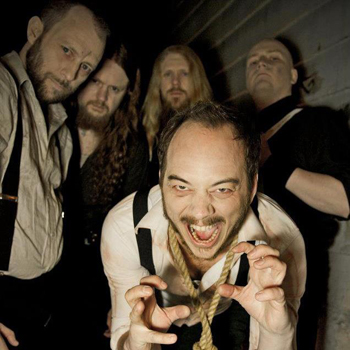
R!: – What are the next plans for Vulture Industries? You have some shows coming up, right?
BN: We have some shows in Norway and then we’re going to play at a festival called ART Mania in Romania which I’m really looking forward to, looks like a really nice festival and it’s always great fun for us to play in that country, we have many friends there. We’re currently working on building a package for a European tour and hopefully we’ll also be able to do a US tour for the first time. We know we have a pretty good fanbase in the US, so there’s a lot of requests for us to come over, so it would be nice, but of course it’s a long and expensive process because of the visas and stuff like that. We don’t want to pay for flights and then just go to spend a day in prison and then fly back home again (laughs). If we do it, we do it with visas.
R!: – Last question, what’s the top 3 typical Norwegian things you do?
BN: Sometimes I take a long time to make decisions. That’s typical Norwegian (laughs). I like to go hiking in the mountains and… apart from that, maybe I’m not so typical Norwegian (laughs)
R!: – No brunost? (It means brown cheese and is made by boiling a mixture of milk, cream, and whey. It’s one of the country’s most iconic foodstuffs)
BN: Hmm… I eat a lot of knekkebrød (crispbread). That’s probably also pretty Norwegian. And I eat a lot of fish which is very west coasty and I eat pinnekjøtt during Christmas time (Editor’s note: traditional Norwegian festive dish based on lamb ribs).
R!: – Thanks for the interview!
BN: Thank you!
VULTURE INDUSTRIES DISCOGRAPHY
The Dystopia Journals – 2007
The Malefactor’s Bloody Register – 2010
The Tower – 2013
Stranger Times – 2017
Ghosts from the Past – 2023
VULTURE INDUSTRIES VIDEOS
“Blood on the Trail” (2013):
“Lost Among Trials” (2013):
“Something Vile” (2017):
“As the World Burns” (2017):
“Strangers” (2017):
“Deeper” (2019):
“New Lords of Light” (2023):

